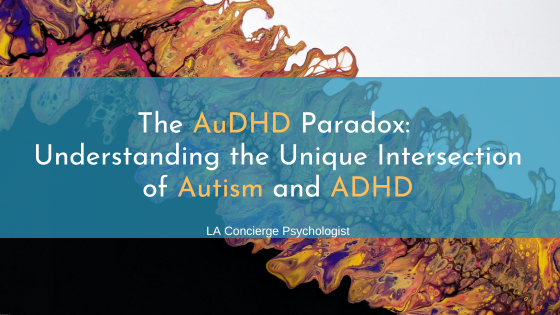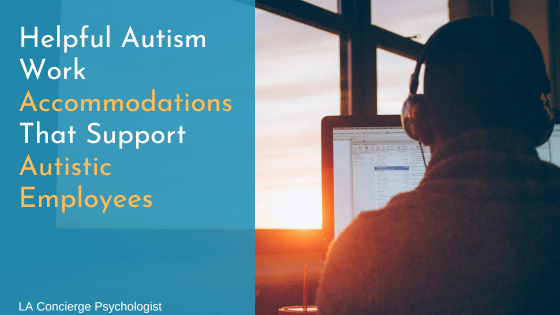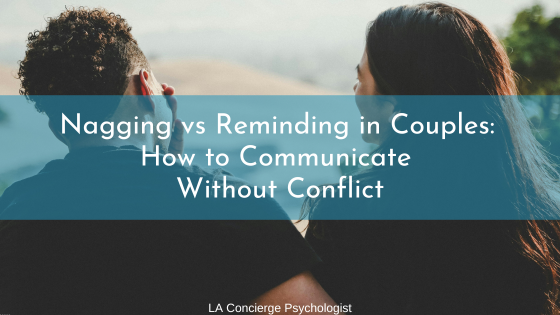Whether you’re formally diagnosed or exploring self-diagnosis of autism or ADHD, learning you’re neurodivergent can offer powerful clarity. Suddenly, lifelong struggles with communication, organization, time management, or emotional regulation begin to make sense. This kind of self-understanding can be incredibly grounding and can open the door to self-compassion and growth.
In your excitement, you may begin to share with others how your neurotype impacts your behavior. Unfortunately, sometimes people misunderstand your intentions when you share about your experiences. They might assume you’re using your neurodivergence as an excuse, even when you’re simply trying to explain your experiences or advocate for your needs. That can feel invalidating or unfair, and it can make navigating relationships more complicated.
Your neurodivergence is a valid and important part of who you are. It can absolutely help explain why certain situations feel challenging. At the same time, healthy relationships involve shared understanding and mutual care. Finding ways to communicate your needs while also showing others that you’re committed to growth can help bridge that gap when misunderstandings arise.
Let’s explore how to honor your neurodivergence as a meaningful explanation for your struggles, while also navigating situations where others may misinterpret that explanation as avoidance or excuse-making.
What is an Explanation versus an Excuse?
When someone learns they are neurodivergent, it can be incredibly validating. Suddenly, so many of your struggles and ways of moving in the world begin to make sense. And when something happens that causes conflict or tension, of course you want to explain why. But often times, neurodivergent people are confronted with the response, “Stop using that as an excuse” or “you’re just making excuses”. This leads to a lot of confusion because you are trying to provide an explanation, not an excuse, for what happened.
So, what is the difference between an explanation and an excuse?
Excuses and explanations may sound similar, but they serve very different purposes. Understanding that difference can meaningfully improve how we reflect on our own behavior. An excuse is usually a way of reducing responsibility for something we did. It shifts the cause outward (“I couldn’t help it because everything went wrong today”) and often aims to protect us from feeling embarrassed, guilty, or inadequate. Psychologically, excuses function as a short-term shield against discomfort. While that can feel relieving in the moment, it often prevents us from looking honestly at patterns that might be getting in our way.
An explanation, by contrast, is a grounded, thoughtful account of why a behavior occurred. It typically includes both the external circumstances and our own role. Explanations acknowledge stressors, misunderstandings, or emotional triggers, but they also recognize that our reactions are influenced by choices, habits, and skills that can be changed. This balance is what makes explanations so valuable. Research across cognitive and behavioral psychology consistently shows that lasting change depends on accurate understanding: we need to know what contributed to a problem in order to respond differently in the future.
Consider the example of consistently being late because of ADHD time blindness. Saying “I have ADHD, so I’m just bad at being on time. There’s nothing I can really do about it.” is an excuse because it implies that the behavior was automatic, unavoidable, and cannot be changed. The statement becomes an explanation when rephrased as “I’m sorry that you were waiting for me again. I struggle with time blindness because of my ADHD. I’m working on some new strategies to improve my timeliness.” It still acknowledges your ADHD time blindness, but it also addresses that some things are within your control that can be improved upon, even if it’s difficult (in this case, time management skills).
Recognizing the line between excuses and explanations is not about being harsh on ourselves; it’s about being honest in a way that supports growth. Excuses can temporarily soothe uncomfortable feelings, but they rarely lead to meaningful change and those around you may eventually feel alienated, frustrated, or resentful. Explanations, on the other hand, help us understand our behavior with clarity and self-compassion. When we move toward explanations, we gain insight, improve our relationships, and build the psychological flexibility needed to navigate life with greater resilience.
Accountability in Neurodivergent Relationships
Learning to take accountability as a neurodivergent adult isn’t about pretending to be neurotypical or denying your limitations. It’s about being honest with yourself and others, acknowledging your impact, and working toward solutions that align with your needs and values.
For example, if you struggle with emotional dysregulation due to autism or ADHD, it’s okay to say:
“I’m sorry I scared you. Sometimes I get overwhelmed and react strongly because of [my ADHD and/or autism], but I’m learning how to manage meltdowns in healthier ways.”
This communicates your neurotype’s intrinsic struggle and responsibility to mitigate the negative impact on your loved ones. You’re not denying the challenge, but you’re also not using it to justify ongoing hurtful behavior.
Real-Life Examples: Turning Struggles into Self-Awareness
Example 1: Chronic Lateness
You may struggle with time blindness, a common ADHD trait that makes it hard to track or estimate time. But simply saying, “I’m always late, deal with it,” isn’t fair to others, especially in professional or personal settings where punctuality has a notable negative impact.
A more accountable approach might be:
“I know being late to dinner frustrated you. ADHD makes it difficult for me to track time, but I’ve started using alarms and time-blocking to stay more on schedule. I really value our time together and want to show that.”
Here, you’re acknowledging the challenge while committing to practical solutions that help manage ADHD struggles. The key is to acknowledge the negative impact and explain how you’re working on it, instead of minimizing the impact on others and deflecting responsibility.
Example 2: Perceived Rudeness
If you’re autistic, you’re likely a straight-forward, direct communicator. Sometimes this can be misperceived by allistic (non-autistic) people as rude or hurtful.
Instead of saying, “I’m autistic, I can’t help it,” try:
“I realize I accidentally hurt your feelings when I said that; I’m sorry. As an autistic person, I tend to be a really direct communicator. But, I’m working on navigating how to be a direct and kind communicator so I don’t unintentionally hurt your feelings. ”
Naming how your autism impacts your communication style helps provide clarity. Acknowledging your efforts to honor your communication style while considering others’ feelings shows a willingness to grow, while still validating your neurotype.
Example 3: Emotional Outbursts or Shutdowns
Both ADHD and autism can involve emotional regulation difficulties, including intense outbursts or total shutdowns when overstimulated or overwhelmed. These experiences are valid. Though, sadly, if you regularly lash out at loved ones without taking responsibility, your relationship will erode.
A helpful reframe might be:
“I know my reaction was intense, and I’m sorry it scared you. I’ve been learning more about how to self-regulate and am working on taking a break before I reach that point. If you see me getting worked up, maybe you can remind me to take a break.”
Your neurotype can make it really difficult to function in a neurotypical world. But, when you begin using your neurotype as a reason to ignore the negative impact you have on others without trying to address that, you’re falling into excuse territory. And, as a result, your relationships will suffer.
What Accountability Looks Like (Even When It’s Hard)
Many neurodivergent people can benefit from a “formula” to help us stay within the spirit of giving explanations versus excuses. Here’s a four step guide we’ve found that helps:
- Apologize for the specific behavior
“I’m sorry I forgot to respond to your message again.” - Acknowledge the impact
“I know that made you feel dismissed, and that’s not okay.” - Explain the challenge without using it as a shield
“I struggle with remembering to respond to messages because of my ADHD.” - Explain what you’re doing to remedy the issue
“I’m working on a system to check my messages at specific times and carve out time to respond to everyone.”
This kind of self-aware dialogue shows maturity, care, and growth, without denying the real struggles involved in being neurodivergent.
Want Support in Navigating Mixed Neurotype Interactions?
If you’re navigating life with ADHD or autism and want support in figuring out how to provide explanations instead of excuses, working with a therapist who understands neurodivergence can make a real difference. Our mixed neurotype couples therapy can be healing for those where the strain of differing neurotypes has led to hurt feelings or resentment. Therapy can help you develop tools that honor your brain while also honoring the people in your life. If you’re ready to take that step, reach out today to explore therapy services that align with your needs and goals.
Send us a message to see how we can help or book a free 20-minute consultation call with Dr. Barajas, Dr. Goldman, or Dr. Smith Han.
Not sure if you’re autistic or an ADHD-er? Email Dr. Lee to schedule a therapeutic, neurodivergent-affirming assessment.



